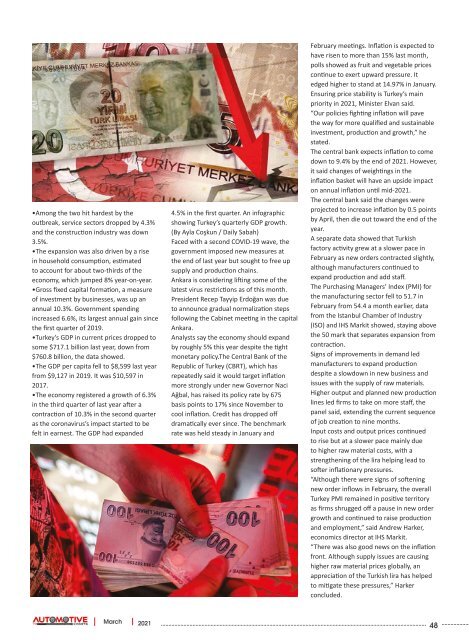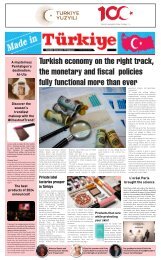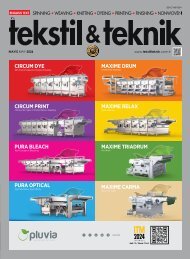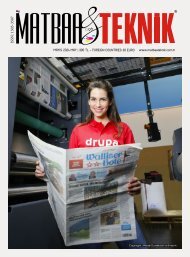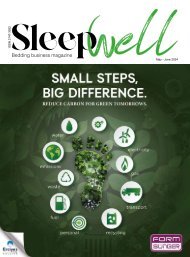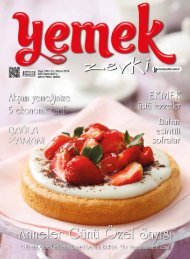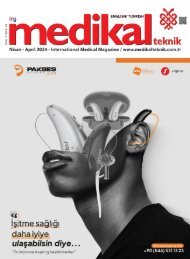Automotive Exports March 2021
Automotive Exports March 2021
Automotive Exports March 2021
You also want an ePaper? Increase the reach of your titles
YUMPU automatically turns print PDFs into web optimized ePapers that Google loves.
•Among the two hit hardest by the<br />
outbreak, service sectors dropped by 4.3%<br />
and the construction industry was down<br />
3.5%.<br />
•The expansion was also driven by a rise<br />
in household consumption, estimated<br />
to account for about two-thirds of the<br />
economy, which jumped 8% year-on-year.<br />
•Gross fixed capital formation, a measure<br />
of investment by businesses, was up an<br />
annual 10.3%. Government spending<br />
increased 6.6%, its largest annual gain since<br />
the first quarter of 2019.<br />
•Turkey’s GDP in current prices dropped to<br />
some $717.1 billion last year, down from<br />
$760.8 billion, the data showed.<br />
•The GDP per capita fell to $8,599 last year<br />
from $9,127 in 2019. It was $10,597 in<br />
2017.<br />
•The economy registered a growth of 6.3%<br />
in the third quarter of last year after a<br />
contraction of 10.3% in the second quarter<br />
as the coronavirus’s impact started to be<br />
felt in earnest. The GDP had expanded<br />
4.5% in the first quarter. An infographic<br />
showing Turkey’s quarterly GDP growth.<br />
(By Ayla Coşkun / Daily Sabah)<br />
Faced with a second COVID-19 wave, the<br />
government imposed new measures at<br />
the end of last year but sought to free up<br />
supply and production chains.<br />
Ankara is considering lifting some of the<br />
latest virus restrictions as of this month.<br />
President Recep Tayyip Erdoğan was due<br />
to announce gradual normalization steps<br />
following the Cabinet meeting in the capital<br />
Ankara.<br />
Analysts say the economy should expand<br />
by roughly 5% this year despite the tight<br />
monetary policy.The Central Bank of the<br />
Republic of Turkey (CBRT), which has<br />
repeatedly said it would target inflation<br />
more strongly under new Governor Naci<br />
Ağbal, has raised its policy rate by 675<br />
basis points to 17% since November to<br />
cool inflation. Credit has dropped off<br />
dramatically ever since. The benchmark<br />
rate was held steady in January and<br />
February meetings. Inflation is expected to<br />
have risen to more than 15% last month,<br />
polls showed as fruit and vegetable prices<br />
continue to exert upward pressure. It<br />
edged higher to stand at 14.97% in January.<br />
Ensuring price stability is Turkey’s main<br />
priority in <strong>2021</strong>, Minister Elvan said.<br />
“Our policies fighting inflation will pave<br />
the way for more qualified and sustainable<br />
investment, production and growth,” he<br />
stated.<br />
The central bank expects inflation to come<br />
down to 9.4% by the end of <strong>2021</strong>. However,<br />
it said changes of weightings in the<br />
inflation basket will have an upside impact<br />
on annual inflation until mid-<strong>2021</strong>.<br />
The central bank said the changes were<br />
projected to increase inflation by 0.5 points<br />
by April, then die out toward the end of the<br />
year.<br />
A separate data showed that Turkish<br />
factory activity grew at a slower pace in<br />
February as new orders contracted slightly,<br />
although manufacturers continued to<br />
expand production and add staff.<br />
The Purchasing Managers’ Index (PMI) for<br />
the manufacturing sector fell to 51.7 in<br />
February from 54.4 a month earlier, data<br />
from the Istanbul Chamber of Industry<br />
(ISO) and IHS Markit showed, staying above<br />
the 50 mark that separates expansion from<br />
contraction.<br />
Signs of improvements in demand led<br />
manufacturers to expand production<br />
despite a slowdown in new business and<br />
issues with the supply of raw materials.<br />
Higher output and planned new production<br />
lines led firms to take on more staff, the<br />
panel said, extending the current sequence<br />
of job creation to nine months.<br />
Input costs and output prices continued<br />
to rise but at a slower pace mainly due<br />
to higher raw material costs, with a<br />
strengthening of the lira helping lead to<br />
softer inflationary pressures.<br />
“Although there were signs of softening<br />
new order inflows in February, the overall<br />
Turkey PMI remained in positive territory<br />
as firms shrugged off a pause in new order<br />
growth and continued to raise production<br />
and employment,” said Andrew Harker,<br />
economics director at IHS Markit.<br />
“There was also good news on the inflation<br />
front. Although supply issues are causing<br />
higher raw material prices globally, an<br />
appreciation of the Turkish lira has helped<br />
to mitigate these pressures,” Harker<br />
concluded.<br />
<strong>March</strong> <strong>2021</strong><br />
48


